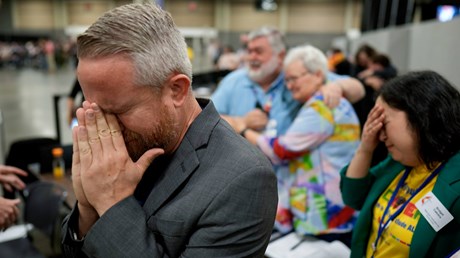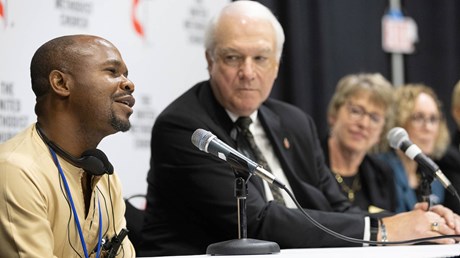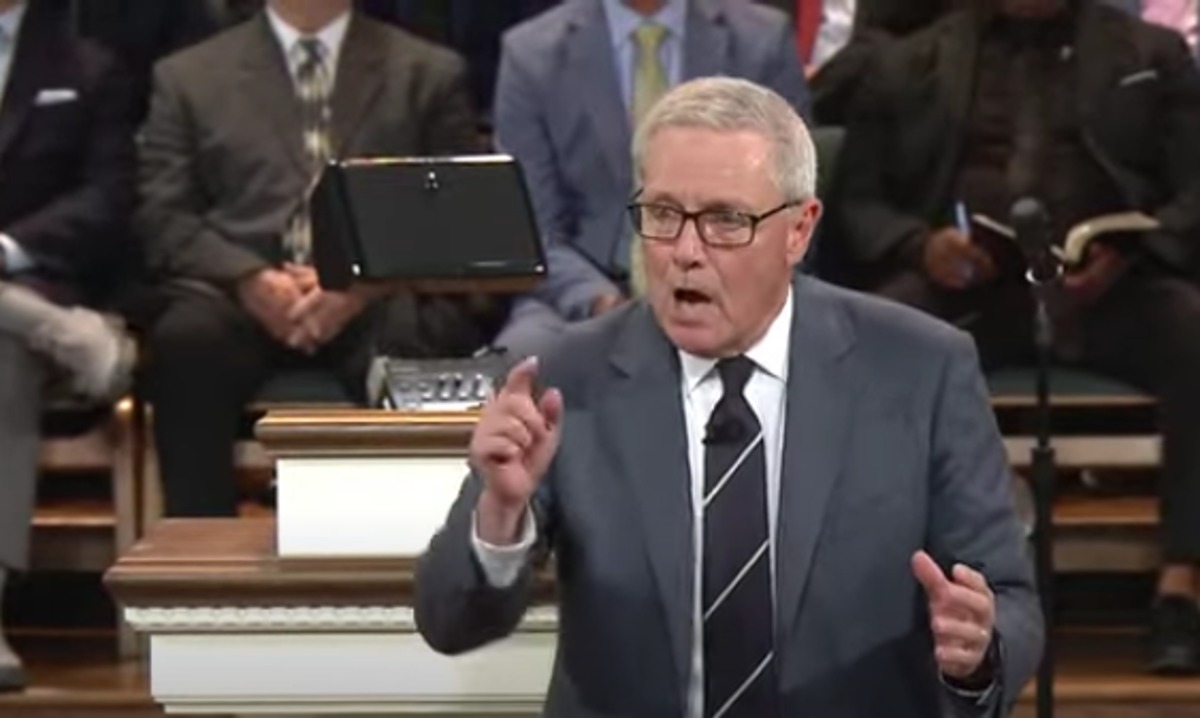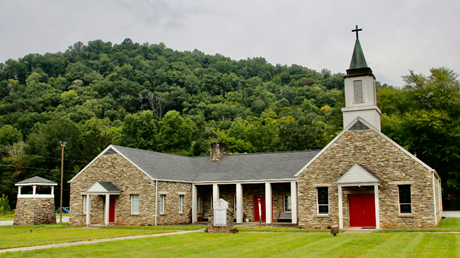Searched: Carolina
News
After years of disagreement and the departure of thousands of churches, the change passed without debate.
 United Methodists meeting for their top legislative assembly Wednesday overwhelmingly overturned a measure that barred gay clergy from ordination in the denomination, a historic step for the nation’s second-largest Protestant body.With a simple vote call and without debate, delegates to the General Conference removed the ban on the ordination of “self-avowed practicing homosexuals”—a prohibition that dates to 1984.With that vote, the worldwide denomination of some 11 million members joins the majority of liberal Protestant denominations such as the Episcopal Church, the Presbyterian Church (USA), the Evangelical Lutheran Church in America, and the United Church of Christ, which also ordain LGBTQ clergy.“We’ve singled out one group for discrimination for 52 years,” said Ken Carter, bishop of the Western North Carolina Conference. “And we’ve done that on an understanding of homosexuality whose origins came when it was understood to be a disease and a disorder.”That, he said, has now changed. “Increasingly,” he said, “people see that God’s spirit is in gay and lesbian people.”The morning vote on the motion was part of a larger series of calendar items voted on in bulk. They also included a motion barring superintendents, or overseers, from punishing clergy for performing a same-sex wedding or prohibiting a church from holding a same-sex wedding, though the actual ban on same-sex weddings in churches has yet to be voted on.The vote on the calendar items was 692–51, or about 93 percent in favor.After the vote, LGBTQ delegates and their allies gathered on the floor of the Charlotte Convention Center to sing, hug, cheer, and shed tears. ...Continue reading... United Methodists meeting for their top legislative assembly Wednesday overwhelmingly overturned a measure that barred gay clergy from ordination in the denomination, a historic step for the nation’s second-largest Protestant body.With a simple vote call and without debate, delegates to the General Conference removed the ban on the ordination of “self-avowed practicing homosexuals”—a prohibition that dates to 1984.With that vote, the worldwide denomination of some 11 million members joins the majority of liberal Protestant denominations such as the Episcopal Church, the Presbyterian Church (USA), the Evangelical Lutheran Church in America, and the United Church of Christ, which also ordain LGBTQ clergy.“We’ve singled out one group for discrimination for 52 years,” said Ken Carter, bishop of the Western North Carolina Conference. “And we’ve done that on an understanding of homosexuality whose origins came when it was understood to be a disease and a disorder.”That, he said, has now changed. “Increasingly,” he said, “people see that God’s spirit is in gay and lesbian people.”The morning vote on the motion was part of a larger series of calendar items voted on in bulk. They also included a motion barring superintendents, or overseers, from punishing clergy for performing a same-sex wedding or prohibiting a church from holding a same-sex wedding, though the actual ban on same-sex weddings in churches has yet to be voted on.The vote on the calendar items was 692–51, or about 93 percent in favor.After the vote, LGBTQ delegates and their allies gathered on the floor of the Charlotte Convention Center to sing, hug, cheer, and shed tears. ...Continue reading... |
After years of disagreement and the departure of thousands of churches, the change passed without debate.
 United Methodists meeting for their top legislative assembly Wednesday overwhelmingly overturned a measure that barred gay clergy from ordination in the denomination, a historic step for the nation’s second-largest Protestant body.With a simple vote call and without debate, delegates to the General Conference removed the ban on the ordination of “self-avowed practicing homosexuals”—a prohibition that dates to 1984.With that vote, the worldwide denomination of some 11 million members joins the majority of liberal Protestant denominations such as the Episcopal Church, the Presbyterian Church (USA), the Evangelical Lutheran Church in America, and the United Church of Christ, which also ordain LGBTQ clergy.“We’ve singled out one group for discrimination for 52 years,” said Ken Carter, bishop of the Western North Carolina Conference. “And we’ve done that on an understanding of homosexuality whose origins came when it was understood to be a disease and a disorder.”That, he said, has now changed. “Increasingly,” he said, “people see that God’s spirit is in gay and lesbian people.”The morning vote on the motion was part of a larger series of calendar items voted on in bulk. They also included a motion barring superintendents, or overseers, from punishing clergy for performing a same-sex wedding or prohibiting a church from holding a same-sex wedding, though the actual ban on same-sex weddings in churches has yet to be voted on.The vote on the calendar items was 692–51, or about 93 percent in favor.After the vote, LGBTQ delegates and their allies gathered on the floor of the Charlotte Convention Center to sing, hug, cheer, and shed tears. ...Continue reading... United Methodists meeting for their top legislative assembly Wednesday overwhelmingly overturned a measure that barred gay clergy from ordination in the denomination, a historic step for the nation’s second-largest Protestant body.With a simple vote call and without debate, delegates to the General Conference removed the ban on the ordination of “self-avowed practicing homosexuals”—a prohibition that dates to 1984.With that vote, the worldwide denomination of some 11 million members joins the majority of liberal Protestant denominations such as the Episcopal Church, the Presbyterian Church (USA), the Evangelical Lutheran Church in America, and the United Church of Christ, which also ordain LGBTQ clergy.“We’ve singled out one group for discrimination for 52 years,” said Ken Carter, bishop of the Western North Carolina Conference. “And we’ve done that on an understanding of homosexuality whose origins came when it was understood to be a disease and a disorder.”That, he said, has now changed. “Increasingly,” he said, “people see that God’s spirit is in gay and lesbian people.”The morning vote on the motion was part of a larger series of calendar items voted on in bulk. They also included a motion barring superintendents, or overseers, from punishing clergy for performing a same-sex wedding or prohibiting a church from holding a same-sex wedding, though the actual ban on same-sex weddings in churches has yet to be voted on.The vote on the calendar items was 692–51, or about 93 percent in favor.After the vote, LGBTQ delegates and their allies gathered on the floor of the Charlotte Convention Center to sing, hug, cheer, and shed tears. ...Continue reading... |
 An appeals court has ruled that West Virginia and North Carolina cannot prohibit Medicaid coverage for so-called gender reassignment procedures for trans-identified individuals. An appeals court has ruled that West Virginia and North Carolina cannot prohibit Medicaid coverage for so-called gender reassignment procedures for trans-identified individuals. |
Florida's? Heartbeat Law? will take effect on Wednesday, May 1 and will protect unborn children and their mothers at six weeks of pregnancy. The law, titled SB300 – Pregnancy and Parenting Support, makes Florida one of the most pro-life states in the nation. At midnight, Florida will join Georgia and South Carolina in having an active law […]The post Florida Heartbeat Law Starts Tomorrow, Saving Babies From Abortion and Helping Pregnant Women appeared first on LifeNews.com.
|
The pastor of a North Carolina mega-church denounced the “God Bless the USA Bible” as blasphemous and disgusting. Watch the […]
|
DEVELOPING STORY: At least 8 law enforcement officers were shot Monday afternoon in Charlotte, North Carolina. Three U.S. Marshals were […]
|
The plan would organize UMC churches in four global regions, with each given more leeway around same-sex marriage and other theological issues.
 The top legislative body of the United Methodist Church passed a series of measures Thursday to restructure the worldwide denomination to give each region greater equity in tailoring church life to its own customs and traditions.The primary measure, voted on as the UMC General Conference met at the Charlotte Convention Center in North Carolina, was an amendment to the church’s constitution to divide the denomination into four equal regions—Africa, Europe, the Philippines, and the United States.According to the plan, each region would be able to customize part of the denomination’s rulebook, the Book of Discipline, to fit local needs. While church regions in Africa, the Philippines, and Europe have already enjoyed some leeway in customizing church life, the United States has not.The vote on the constitutional amendment passed 586–164, or by 78 percent, which means it surpassed the two-thirds majority needed for constitutional amendments. It must now go before each smaller church region, called an annual conference, for ratification by the end of 2025.If ratified by two-thirds of delegates to the annual conferences, the restructuring would allow the four regions to set their own qualifications for ordaining clergy and lay leaders; publish their own hymnal and rituals, including rites for marriage; and establish its own judicial courts. A new Book of Discipline would have one section that could be revised and tailored for each of the four regional conferences.The two-week worldwide meeting is the first meeting of the General Conference in five years, due mostly to delays associated with the COVID-19 pandemic. It follows a painful schism that has split some 7,600 US-based churches from the denomination—a ...Continue reading... The top legislative body of the United Methodist Church passed a series of measures Thursday to restructure the worldwide denomination to give each region greater equity in tailoring church life to its own customs and traditions.The primary measure, voted on as the UMC General Conference met at the Charlotte Convention Center in North Carolina, was an amendment to the church’s constitution to divide the denomination into four equal regions—Africa, Europe, the Philippines, and the United States.According to the plan, each region would be able to customize part of the denomination’s rulebook, the Book of Discipline, to fit local needs. While church regions in Africa, the Philippines, and Europe have already enjoyed some leeway in customizing church life, the United States has not.The vote on the constitutional amendment passed 586–164, or by 78 percent, which means it surpassed the two-thirds majority needed for constitutional amendments. It must now go before each smaller church region, called an annual conference, for ratification by the end of 2025.If ratified by two-thirds of delegates to the annual conferences, the restructuring would allow the four regions to set their own qualifications for ordaining clergy and lay leaders; publish their own hymnal and rituals, including rites for marriage; and establish its own judicial courts. A new Book of Discipline would have one section that could be revised and tailored for each of the four regional conferences.The two-week worldwide meeting is the first meeting of the General Conference in five years, due mostly to delays associated with the COVID-19 pandemic. It follows a painful schism that has split some 7,600 US-based churches from the denomination—a ...Continue reading... |
 A Pentecostal pastor is urging his congregants not to embrace the “God Bless the USA Bible” that includes documents central to the founding of the United States, deriding it as “blasphemous.” A Pentecostal pastor is urging his congregants not to embrace the “God Bless the USA Bible” that includes documents central to the founding of the United States, deriding it as “blasphemous.” |
The plan would organize UMC churches in four global regions, with each given more leeway around same-sex marriage and other theological issues.
 The top legislative body of the United Methodist Church passed a series of measures Thursday to restructure the worldwide denomination to give each region greater equity in tailoring church life to its own customs and traditions.The primary measure, voted on as the UMC General Conference met at the Charlotte Convention Center in North Carolina, was an amendment to the church’s constitution to divide the denomination into four equal regions—Africa, Europe, the Philippines, and the United States.According to the plan, each region would be able to customize part of the denomination’s rulebook, the Book of Discipline, to fit local needs. While church regions in Africa, the Philippines, and Europe have already enjoyed some leeway in customizing church life, the United States has not.The vote on the constitutional amendment passed 586–164, or by 78 percent, which means it surpassed the two-thirds majority needed for constitutional amendments. It must now go before each smaller church region, called an annual conference, for ratification by the end of 2025.If ratified by two-thirds of delegates to the annual conferences, the restructuring would allow the four regions to set their own qualifications for ordaining clergy and lay leaders; publish their own hymnal and rituals, including rites for marriage; and establish its own judicial courts. A new Book of Discipline would have one section that could be revised and tailored for each of the four regional conferences.The two-week worldwide meeting is the first meeting of the General Conference in five years, due mostly to delays associated with the COVID-19 pandemic. It follows a painful schism that has split some 7,600 US-based churches from the denomination—a ...Continue reading... The top legislative body of the United Methodist Church passed a series of measures Thursday to restructure the worldwide denomination to give each region greater equity in tailoring church life to its own customs and traditions.The primary measure, voted on as the UMC General Conference met at the Charlotte Convention Center in North Carolina, was an amendment to the church’s constitution to divide the denomination into four equal regions—Africa, Europe, the Philippines, and the United States.According to the plan, each region would be able to customize part of the denomination’s rulebook, the Book of Discipline, to fit local needs. While church regions in Africa, the Philippines, and Europe have already enjoyed some leeway in customizing church life, the United States has not.The vote on the constitutional amendment passed 586–164, or by 78 percent, which means it surpassed the two-thirds majority needed for constitutional amendments. It must now go before each smaller church region, called an annual conference, for ratification by the end of 2025.If ratified by two-thirds of delegates to the annual conferences, the restructuring would allow the four regions to set their own qualifications for ordaining clergy and lay leaders; publish their own hymnal and rituals, including rites for marriage; and establish its own judicial courts. A new Book of Discipline would have one section that could be revised and tailored for each of the four regional conferences.The two-week worldwide meeting is the first meeting of the General Conference in five years, due mostly to delays associated with the COVID-19 pandemic. It follows a painful schism that has split some 7,600 US-based churches from the denomination—a ...Continue reading... |
The plan would organize UMC churches in four global regions, with each given more leeway around same-sex marriage and other theological issues.
 The top legislative body of the United Methodist Church passed a series of measures Thursday to restructure the worldwide denomination to give each region greater equity in tailoring church life to its own customs and traditions.The primary measure, voted on as the UMC General Conference met at the Charlotte Convention Center in North Carolina, was an amendment to the church’s constitution to divide the denomination into four equal regions—Africa, Europe, the Philippines, and the United States.According to the plan, each region would be able to customize part of the denomination’s rulebook, the Book of Discipline, to fit local needs. While church regions in Africa, the Philippines, and Europe have already enjoyed some leeway in customizing church life, the United States has not.The vote on the constitutional amendment passed 586–164, or by 78 percent, which means it surpassed the two-thirds majority needed for constitutional amendments. It must now go before each smaller church region, called an annual conference, for ratification by the end of 2025.If ratified by two-thirds of delegates to the annual conferences, the restructuring would allow the four regions to set their own qualifications for ordaining clergy and lay leaders; publish their own hymnal and rituals, including rites for marriage; and establish its own judicial courts. A new Book of Discipline would have one section that could be revised and tailored for each of the four regional conferences.The two-week worldwide meeting is the first meeting of the General Conference in five years, due mostly to delays associated with the COVID-19 pandemic. It follows a painful schism that has split some 7,600 US-based churches from the denomination—a ...Continue reading... The top legislative body of the United Methodist Church passed a series of measures Thursday to restructure the worldwide denomination to give each region greater equity in tailoring church life to its own customs and traditions.The primary measure, voted on as the UMC General Conference met at the Charlotte Convention Center in North Carolina, was an amendment to the church’s constitution to divide the denomination into four equal regions—Africa, Europe, the Philippines, and the United States.According to the plan, each region would be able to customize part of the denomination’s rulebook, the Book of Discipline, to fit local needs. While church regions in Africa, the Philippines, and Europe have already enjoyed some leeway in customizing church life, the United States has not.The vote on the constitutional amendment passed 586–164, or by 78 percent, which means it surpassed the two-thirds majority needed for constitutional amendments. It must now go before each smaller church region, called an annual conference, for ratification by the end of 2025.If ratified by two-thirds of delegates to the annual conferences, the restructuring would allow the four regions to set their own qualifications for ordaining clergy and lay leaders; publish their own hymnal and rituals, including rites for marriage; and establish its own judicial courts. A new Book of Discipline would have one section that could be revised and tailored for each of the four regional conferences.The two-week worldwide meeting is the first meeting of the General Conference in five years, due mostly to delays associated with the COVID-19 pandemic. It follows a painful schism that has split some 7,600 US-based churches from the denomination—a ...Continue reading... |
Loran Livingston, lead pastor of Central Church in Charlotte, North Carolina, delivered? a Sunday sermon to his congregation of about 6,000 people concerning the importance of studying Scripture rightly without outside interference from false doctrine.
|
Study: 24 percent of clergy in North Carolina are still opposed to same-sex marriage.
 After the departure of thousands of traditionalist United Methodist churches from the denomination over the past five years, it might stand to reason that those congregations remaining in the fold are more progressive and open to ordination and marriage of people in same-sex relationships.But the picture is far more mixed.A new report from the Religion and Social Change Lab at Duke University that looked at disaffiliating clergy from North Carolina’s two United Methodist conferences or regions found that even after the departures, 24 percent of North Carolina clergy remaining in the denomination disagree with allowing LGBTQ people to get married or ordained within the denomination.“At least some amount of ambivalence over LGBTQ+ issues among UMC clergy is likely to persist for years to come,” the report concluded.After a four-year COVID-19 delay and the departure of about 7,600 churches—a loss of 25 percent of all its US congregations—the denomination is likely to reconsider the issue of human sexuality when it convenes its top legislative body April 23–May 3 in Charlotte, North Carolina.Given that the denomination is a worldwide body, with hundreds of delegates from Africa and the Philippines, areas far more conservative in their views of human sexuality, it’s unclear whether the measures stand a chance of passing, even as the US delegation is far more open to such changes.Overall, the Duke report finds that disaffiliating North Carolina clergy were much more politically and theologically conservative than those who chose to remain. Some 85 percent of clergy who left the denomination disagreed with the notion that “all religious leadership positions should be open to people ...Continue reading... After the departure of thousands of traditionalist United Methodist churches from the denomination over the past five years, it might stand to reason that those congregations remaining in the fold are more progressive and open to ordination and marriage of people in same-sex relationships.But the picture is far more mixed.A new report from the Religion and Social Change Lab at Duke University that looked at disaffiliating clergy from North Carolina’s two United Methodist conferences or regions found that even after the departures, 24 percent of North Carolina clergy remaining in the denomination disagree with allowing LGBTQ people to get married or ordained within the denomination.“At least some amount of ambivalence over LGBTQ+ issues among UMC clergy is likely to persist for years to come,” the report concluded.After a four-year COVID-19 delay and the departure of about 7,600 churches—a loss of 25 percent of all its US congregations—the denomination is likely to reconsider the issue of human sexuality when it convenes its top legislative body April 23–May 3 in Charlotte, North Carolina.Given that the denomination is a worldwide body, with hundreds of delegates from Africa and the Philippines, areas far more conservative in their views of human sexuality, it’s unclear whether the measures stand a chance of passing, even as the US delegation is far more open to such changes.Overall, the Duke report finds that disaffiliating North Carolina clergy were much more politically and theologically conservative than those who chose to remain. Some 85 percent of clergy who left the denomination disagreed with the notion that “all religious leadership positions should be open to people ...Continue reading... |
Study: 24 percent of clergy in North Carolina are still opposed to same-sex marriage.
 After the departure of thousands of traditionalist United Methodist churches from the denomination over the past five years, it might stand to reason that those congregations remaining in the fold are more progressive and open to ordination and marriage of people in same-sex relationships.But the picture is far more mixed.A new report from the Religion and Social Change Lab at Duke University that looked at disaffiliating clergy from North Carolina’s two United Methodist conferences or regions found that even after the departures, 24 percent of North Carolina clergy remaining in the denomination disagree with allowing LGBTQ people to get married or ordained within the denomination.“At least some amount of ambivalence over LGBTQ+ issues among UMC clergy is likely to persist for years to come,” the report concluded.After a four-year COVID-19 delay and the departure of about 7,600 churches—a loss of 25 percent of all its US congregations—the denomination is likely to reconsider the issue of human sexuality when it convenes its top legislative body April 23–May 3 in Charlotte, North Carolina.Given that the denomination is a worldwide body, with hundreds of delegates from Africa and the Philippines, areas far more conservative in their views of human sexuality, it’s unclear whether the measures stand a chance of passing, even as the US delegation is far more open to such changes.Overall, the Duke report finds that disaffiliating North Carolina clergy were much more politically and theologically conservative than those who chose to remain. Some 85 percent of clergy who left the denomination disagreed with the notion that “all religious leadership positions should be open to people ...Continue reading... After the departure of thousands of traditionalist United Methodist churches from the denomination over the past five years, it might stand to reason that those congregations remaining in the fold are more progressive and open to ordination and marriage of people in same-sex relationships.But the picture is far more mixed.A new report from the Religion and Social Change Lab at Duke University that looked at disaffiliating clergy from North Carolina’s two United Methodist conferences or regions found that even after the departures, 24 percent of North Carolina clergy remaining in the denomination disagree with allowing LGBTQ people to get married or ordained within the denomination.“At least some amount of ambivalence over LGBTQ+ issues among UMC clergy is likely to persist for years to come,” the report concluded.After a four-year COVID-19 delay and the departure of about 7,600 churches—a loss of 25 percent of all its US congregations—the denomination is likely to reconsider the issue of human sexuality when it convenes its top legislative body April 23–May 3 in Charlotte, North Carolina.Given that the denomination is a worldwide body, with hundreds of delegates from Africa and the Philippines, areas far more conservative in their views of human sexuality, it’s unclear whether the measures stand a chance of passing, even as the US delegation is far more open to such changes.Overall, the Duke report finds that disaffiliating North Carolina clergy were much more politically and theologically conservative than those who chose to remain. Some 85 percent of clergy who left the denomination disagreed with the notion that “all religious leadership positions should be open to people ...Continue reading... |
The battle for women's rights in the arena of sports has been ongoing, but considering the recent contradictory remarks of South Carolina coach Dawn Staley - a Christian herself - controversy has been ignited once again!
|
[Hudson, NC – March 7] Celebration In The Foothills, the two night event that celebrated the Mylon Hayes Family's 10th year in full time ministry in 2021, is only six months away. After three successful years, the event is returning to Hickory, North Carolina for its fourth installment on August 15 – 16, 2024. Located Read More
|
WASHINGTON, D.C. - Family Research Council (FRC) along with post-abortion expert Dr. Martha Shuping submitted an amicus brief last week in the case of U.S. Food and Drug Administration v. Alliance for Hippocratic Medicine, which is currently before the U.S. Supreme Court and will be argued on March 26. At issue in the case is the Food and Drug Administration's (FDA) approval of the abortion drug mifepristone and the agency's 2016 and 2021 removals of health safeguards for women and girls. Dr. Shuping, a North Carolina psychiatrist, has witnessed first-hand the psychological trauma women have experienced because of abortions, including through the effects of intimate partner violence....
|
 In 1777, Cherokee statesman Kaiyahtehee, also known as “Old Tassel,†arrived at Fort Henry near the Long Island in the Holston River to negotiate a treaty with commissioners from the state of North Carolina. The treaty would give America land...The post How churches can participate in the Indigenous Land Back movement and why they should appeared first on Baptist News Global. In 1777, Cherokee statesman Kaiyahtehee, also known as “Old Tassel,†arrived at Fort Henry near the Long Island in the Holston River to negotiate a treaty with commissioners from the state of North Carolina. The treaty would give America land...The post How churches can participate in the Indigenous Land Back movement and why they should appeared first on Baptist News Global. |
The Christian humanitarian organization Samaritan's Purse plans to dedicate a new airlift response center and cargo aircraft in North Carolina.
|
A group of 36 North Carolina-based United Methodist churches are expected to depart the denomination come November.
|
In the mid-1700s, a pastor by the name of Shubal Stearns led the Sandy Creek Baptist Church in North Carolina. During the Separate Baptist Revival led by Bro. Stearns, 17 men were ordained and planted churches. Through those early church planting efforts, it is possible to trace in one generation 500 Baptist church plants back to Sandy Creek Baptist Church and in two generations over 1,000 Baptist church plants were traced back to this church!
|
I've been very busy traveling during the past several months. Alaska, New York, Missouri, and North Carolina are a few of the places I've been recently. It's
|
I have been busy traveling and working at the museum. I'm in Charlotte, North Carolina, this week and part of the next, where I'm recording two new CDs. Today
|
In the mid-1700s, a pastor by the name of Shubal Stearns led the Sandy Creek Baptist Church in North Carolina. During the Separate Baptist Revival led by Bro. Stearns, 17 men were ordained and planted churches. Through those early church planting efforts, it is possible to trace in one generation 500 Baptist church plants back to Sandy Creek Baptist Church and in two generations over 1,000 Baptist church plants were traced back to this church!The post A Formula for Church Planting appeared first on Cornerstone Baptist Church.
|
Bro. Rommel and Sis. Rose and their children are relocating to North Carolina. We miss you already.
 |



 Links
Links  Articles
Articles  Blogs
Blogs  Videos
Videos  News
News  Colors
Colors 

 New links
New links

